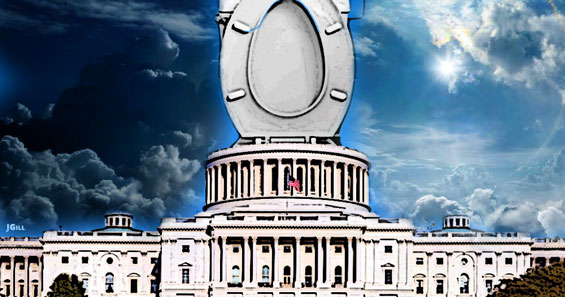Paul Jacob
Every time I flush the toilet, I think of Congress.
Well, that’s not quite right. Every time I have to flush twice, I think of Congress.
It’s been over a decade now that Americans have had to put up with ineffective toilets, toilets that don’t flush properly. In 1992, supposedly to save water, Congress mandated that all newly manufactured home toilets flush with less water than the industry had previously set as standard. Instead of flushing with over three gallons of rushing water, toilets were mandated to flush with no more than 1.6 gallons.
And, with this, American frustration with their toilets began in earnest.
Now, to benefit those readers from the nearby star Fomalhaut lurking in our midst — alien creatures who may lack excretory systems — some explanation is in order. For the rest of us, I’ll keep this brief.
Human beings, like all animals, must process food to survive. But not everything that goes in is usable for nourishment, so the inutile matter is excreted out in liquid and solid forms. This much science and common sense tell us with certainty, and we all know that where there’s humanity, there’s also its waste by-product. Skeptical Fomalhautians, perhaps prissily disgusted by our animality, might consider researching the role of human waste in the development of human civilization — or even before, with the study of coprolites (fossil excrement).
Great moments in dealing with human waste spot the human story. In Crete, at Knossos, an elaborate sewerage was built, perhaps the first in human history. The ancient Israelites, in wartime, carried spears with shovels on the blunt end, to bury their feces so that the Lord would not walk on defiled ground. Romans placed public toilets at street side, with toilet holes separated by mere inches: citizens and denizens, male and female, would hitch up their togas and go, talking to their neighbors all the while. And one reason we shake with the right hand is that — before toilet paper — the left hand was traditionally for wiping. Prior to modern times, the lingering odor of human excrement was all too common.
In modern times two inventions stand out: toilet paper and the toilet, or “water closet.” Hygiene increased in efficiency, and with it the control of disease (human waste is not exactly the cleanest element of human life). It’s almost impossible, now, to conceive of civilization without both. And yet, these are recent developments. Everyone should appreciate just how good we have it today.
Perhaps my readers from Fomalhaut will accept a general principle from one of this age’s leading science fiction writers, Brian Aldiss: “Civilization is the distance man puts between himself and his own excreta.” And with this as a standard, I think we can indeed assert that there has been progress in civilization over the last few hundred years.
Unfortunately, that progress has been interrupted. By Congress.
Indeed, I’m sure there are many Americans who would jovially accept the toilet as an apt symbol for our Congress. But I will have none of it. To me, the toilet is a triumph of private enterprise and human ingenuity.
Instead, I prefer to see what’s left in the toilet bowl as a symbol of Congress. A clogged mass of disgusting waste.
But, enough of symbols. What to do? Congress, in the earnest business of saving a scarce resource (more scarce in some regions than in others), regulated an industry so that, now, to rid a toilet of solid waste, you must often flush twice. Or thrice. This does not save water. But Congress goes on as if it has performed well.
And the plunger is now a necessary tool in every bathroom in the house.
All because Congress couldn’t leave well enough alone.
There have been several attempts, in recent years, to repeal this idiotic regulation of the toilet, allowing for larger reservoirs. Each attempt failed. And now the cause has been abandoned. Experts tell me that toilets have improved in recent years, and the pressure is off for reform.
I mentioned this to a builder recently. He was surprised. The toilets he installs are still as, er, crappy, as ever. “Oh, sure,” he says, “the inner mechanics have improved. And the more expensive toilets do flush almost as well as they used to twenty years ago. But what family can afford to spend a thousand bucks on a toilet?”
Not mine. My wife complained to me, recently, about our twelve-year-old clogging the toilet again. I defended the poor kid. Don’t blame kids, blame Congress! (Putting blame where blame is due is one of my jobs, as you can witness with my free Common Sense e‑letter.) As a practical response, I’m considering replacing our toilets. But the most promising flushers are pricy. Isn’t it interesting how rarely Congress makes things cheaper? Hmmm, maybe it’s time to search the black markets for the white porcelain masterpieces of yesteryear …
So, before voting this year for your incumbent Congressperson, call his or her office and ask your rep to unclog the 106th Congress’s H.R. 623, which sought to repeal the regulation. If your Congressman gives you the run-around — and especially if your representative was one of the 13 subcommittee members who plunged this down the figurative toilet in 2000 — then go to the polls with this in mind: flush Congress.
Well, just to make certain, I guess you had better flush twice.
Townhall, October 24, 2004
